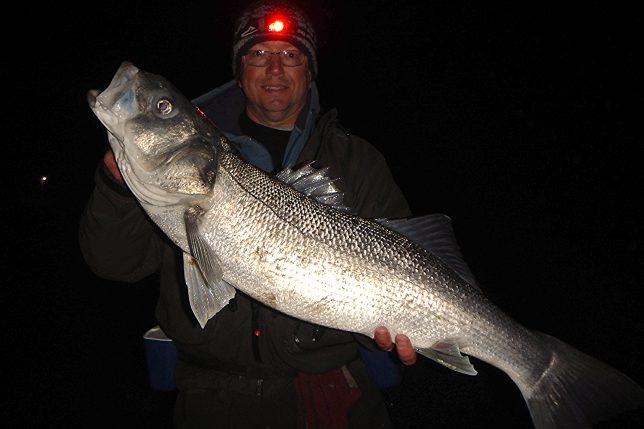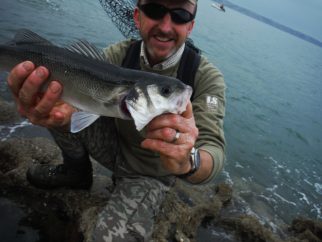Big Chickens Lay More Eggs by Jonathon Burton
If anyone reading this has ever kept chickens (like me), they will know that the biggest birds that are in top condition will lay the biggest and most eggs. The smaller younger birds will still lay eggs, but not as many and not as big. To get a constant supply of eggs you need to care for the younger birds, bring them on until they are bigger and in top condition.

It is exactly the same for Bass. When you next catch a small Bass, unhook it carefully, wetting your hands or using a cloth soaked in the sea, before handling, avoiding the spines and gill plates, and gently returning it to the sea. Give it a chance to grow, gaining that extra weight and size that will enable it to reproduce.
If you are lucky or skilled enough to catch a big Bass in the 60 to 80 cm bracket, give it the five star treatment. These are the fish that will be the big players in the breeding game. Not only have they managed to avoid a myriad of predators, they are on top in the survival game. They have reached maturity, they are passing their survival genes onto their offspring. These fish may also be local to your patch and will return to give you sport in the future.
 As Bass grow, the number of young they can produce increases exponentially; a 60cm fish can produce around 1 million young whereas an 80cm fish, just a third bigger, can produce three times as many at around 3 million. Fish of this size will almost always be female and the more eggs they produce the better as very few will survive the first few weeks of life. Big strong Bass produce bigger, stronger eggs and so big strong fry, better equipped to survive. These fish need to handled very carefully, kept in the water, until weighing, measuring or being photographed. Hold the fish gently in the sea until she has the strength to swim from your hands back to her home.
As Bass grow, the number of young they can produce increases exponentially; a 60cm fish can produce around 1 million young whereas an 80cm fish, just a third bigger, can produce three times as many at around 3 million. Fish of this size will almost always be female and the more eggs they produce the better as very few will survive the first few weeks of life. Big strong Bass produce bigger, stronger eggs and so big strong fry, better equipped to survive. These fish need to handled very carefully, kept in the water, until weighing, measuring or being photographed. Hold the fish gently in the sea until she has the strength to swim from your hands back to her home.
With Bass numbers at an all time low, catch and release is always going to be the gold standard, but if you want to keep a fish for the table (providing that’s legal at the time), keep one in the 50 to 60 cm bracket, a fish of this size will have spawned several times, there is a chance they could be male, but if female they are not yet the super layers like the big females.
So the next time you find yourself attached to a big Bass, take a big breath, keep calm and think of the big chickens laying the biggest and most eggs. Keep her in top condition, return her to her job of laying those big strong eggs that will ensure our and future generations will be able to catch one of the most beautiful fish that swims, and hopefully it will become a more common event.
First published in Sea Angler in 2016